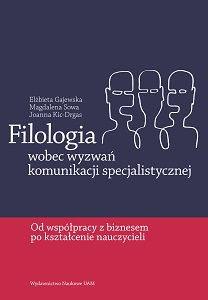Filologia wobec wyzwań komunikacji specjalistycznej. d współpracy z biznesem po kształcenie nauczycieli
Philology and the Challenges of Specialist Communication. From Cooperation with Business to Teacher Training
Author(s): Elżbieta Gajewska, Magdalena Sowa, Joanna Kic-Drgas
Subject(s): Language and Literature Studies, Applied Linguistics, Cognitive linguistics
Published by: Wydawnictwo Naukowe Uniwersytetu Adama Mickiewicza
Keywords: specialist language teaching; cooperation with the economy; foreign languages; philologies; modern languages education
Summary/Abstract: The publication is a three-author monograph prepared in cooperation with the Pedagogical University in Kraków (KEN), Maria Skłodowska-Curie University in Lublin and Adam Mickiewicz University. The study programmes of philology studies at Polish universities are subject to constant evolution in order to adapt to the expectations of the changing labour market and boost their graduates' employability. Changes in the profile of education of philologists are sometimes very important. This publication analyses three areas in which it is particularly visible how philology studies open up possibilities for their graduates' professional careers in a company, which is understood here in broad terms: these areas are cooperation between the university and the business environment, preparing students to communicate in a foreign language in specialist contexts, and training teachers of specialist languages who can respond to the expectations of specific audiences. The study programmes of six popular philologies at 22 Polish universities were analysed, i.e. English, German, Romance languages, Hispanism, Italian and Russian studies. The authors have sought to describe the forms and methods of university education on neophilology degree courses through the prism of the main assumptions of specialist glottodidactics. Therefore, this monograph is, on the one hand, a record of the real state of affairs, which can be observed in terms of the curricula offered on neophilology degree courses in Poland. On the other, it is also an illustration of how and to what extent the theoretical and methodological assumptions of specialist glottodidactics impact on the shape of each training programme preparing for the profession. The rich research material forming the basis of this study makes it possible to discern the changes that have affected the education of philologists in Poland, and to show the place specialist language teaching has in current neophilology education. The results of the analysis indicate the directions for developing the teaching on offer, and may also act as an inspiration for potential modifications.
- E-ISBN-13: 978-83-232-3834-8
- Print-ISBN-13: 978-83-232-3833-1
- Page Count: 238
- Publication Year: 2020
- Language: Polish
- eBook-PDF
- Table of Content
- Introduction

